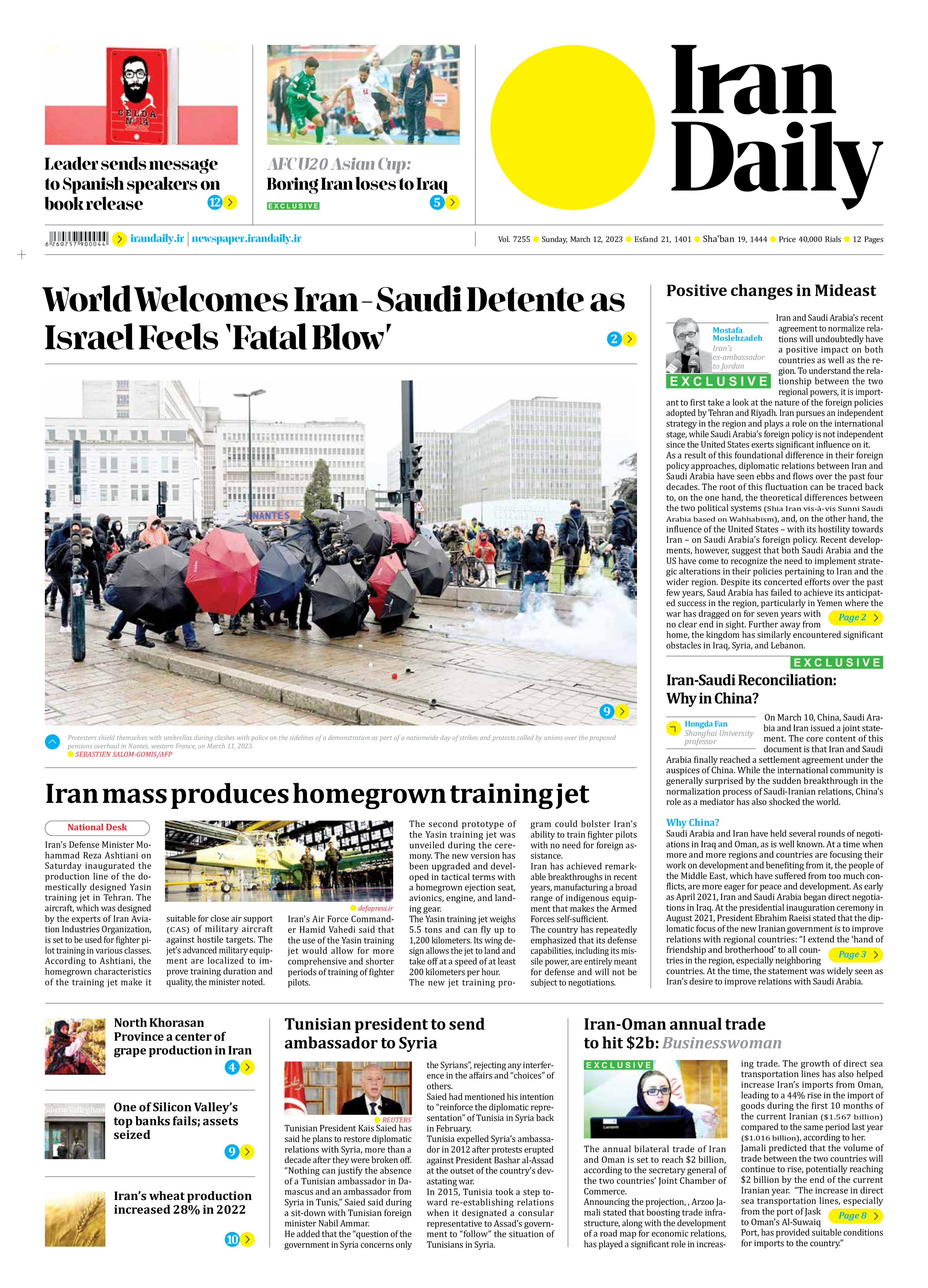
World Welcomes Iran-Saudi Detente as Israel Feels ‘Fatal Blow’
Various countries welcomed the restoration of diplomatic relations between Iran and Saudi Arabia, while the Zionist regime seems to view the development as a “fatal blow” to its regional coalition building against the Islamic Republic.
After several days of intensive negotiations hosted by China, Iran and Saudi Arabia finally clinched a deal on Friday to restore diplomatic relations and reopen embassies, seven years after ties were severed over several issues, Press TV wrote.
The important development soon became a hot topic in Iranian, regional as well as international media, drawing reactions from inside the country as well as other states. “The return to normal relations between the Islamic Republic of Iran and Saudi Arabia provides both countries, the region and the Muslim world with great capacities,” Iranian Foreign Minister Hossein Amir-Abdollahian, who is set to soon meet his Saudi counterpart Prince Faisal bin Farhan Al Saud to make the necessary arrangements, wrote in a post on his Twitter account.
“The good neighborliness policy, as the key axis of the Iranian government’s foreign policy, is strongly moving in the right direction and the diplomatic apparatus is actively behind the preparation of more regional steps,” he said. The Iranian foreign minister also held separate phone conversations with his Omani, Iraqi, and Qatari counterparts who embraced the resumption of ties.
Iranian Parliament Speaker Mohammad Baqer Qalibaf also hailed the agreement in a tweet, describing it as an important step toward stability in the region and the Persian Gulf as well as political and economic development through regional cooperation. The Iranian government’s spokesman Ali Bahadori Jahromi also wrote in a tweet that West Asia’s security and economy are “ensured and constructed” by its governments, without foreign interference. He said the “historic agreement” between Iran and Saudi Arabia in China following rounds of all-Asian negotiations will change regional relations.
‘Dialogue eyed’
Saudi National Security Adviser Musaid Al Aiban, who negotiated the agreement with Secretary of Iran’s Supreme National Security Council (SNSC) Ali Shamkhani, said that Riyadh “welcomes the initiative of His Excellency President Xi Jinping, based on the Kingdom’s consistent and continuous approach since its establishment in adhering to the principles of good neighborliness.”
He said Saudi Arabia takes “everything that would enhance security and stability in the region and the world,” while “adopting the principle of dialogue and diplomacy to resolve differences.”
“While we value what we have reached, we hope that we would continue the constructive dialogue in accordance with the pillars and foundations included in the agreement, expressing our appreciation for China’s continued positive role in this regard.”
‘Victory for dialogue’
China’s top diplomat Wang Yi praised the agreement as “a victory for dialogue, a victory for peace, offering major good news at a time of much turbulence in the world”.
China will continue to play a constructive role in handling hotspot issues in the world and demonstrate its responsibility as a major nation, Wang said.
“The world is not just limited to the Ukraine issue.”
Emirati Foreign Minister Sheikh Abdullah bin Zayed welcomed on Saturday the agreement between Saudi Arabia and Iran as an “important step toward stability and prosperity” in the region.
EU statement
The European Union also welcomed the normalization of Tehran-Riyadh ties in a statement, stressing that it can contribute to the stability in the entire region, ISNA reported. The statement added the bloc is awaiting the implementation of the agreement, saying the EU appreciates diplomatic efforts that led to the important step.
The EU noted that both Iran and Saudi Arabia play a pivotal role in ensuring regional security.
Hezbollah reaction
Addressing a local event on Friday, Secretary General of Lebanon’s Hezbollah resistance movement Sayyed Hassan Nasrallah said the agreement will be “to the benefit” of the region.
“The rapprochement of Iran and Saudi Arabia proceeds in its normal path and can open new horizons for the region and Lebanon,” he said.
Türkiye also welcomed the new development in a statement.
De-escalation hailed
In its first reaction, the United States claimed that it embraces “de-escalation” in West Asia.
“Generally speaking, we welcome any efforts to help end the war in Yemen and de-escalate tensions in the Middle East region. De-escalation and diplomacy together with deterrence are key pillars of the policy President [Joe] Biden outlined during his visit to the region last year,” a White House National Security Council spokesperson told Reuters.
Ansarullah comment
Mohammed Abdulsalam, the Yemeni Ansarullah resistance movement’s chief negotiator, said the region is in need of resumption of “normal ties” between its countries.
“The region needs the resumption of normal ties between its countries for the Islamic nation to reclaim its lost security as a result of foreign, especially American-Zionist, interferences,” he tweeted. Foreign interference, he said, has taken advantage of differences in the region and used Iranophobia to wage aggression on Yemen. The rapprochement deal was also hailed by Syria, Tunisia, Pakistan, Afghanistan caretaker government Taliban and the Palestinian Islamic Jihad resistance movement.
‘Dangerous development’
Meanwhile, the Israeli regime did not seem to take the development so well. Former Israeli prime minister Naftali Bennett called the agreement a “political victory” for Iran and a “serious and dangerous development for Israel”.
“This delivers a fatal blow to efforts to build a regional coalition against Iran,” he said.
Another former Israeli Prime Minister Yair Lapid also described the reconciliation deal as a dangerous development that strips Israel of its regional defensive wall.
The agreement between Saudi Arabia and Iran reflects the complete and dangerous failure of Israel’s foreign policy, Lapid said.







